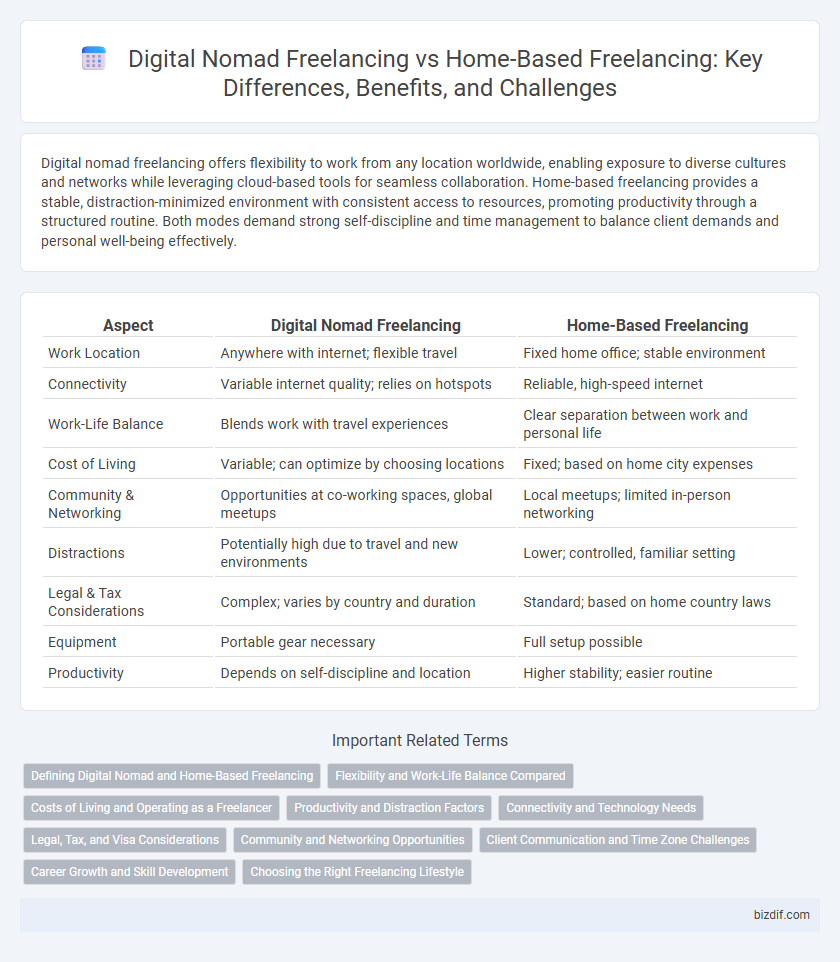Digital nomad freelancing offers flexibility to work from any location worldwide, enabling exposure to diverse cultures and networks while leveraging cloud-based tools for seamless collaboration. Home-based freelancing provides a stable, distraction-minimized environment with consistent access to resources, promoting productivity through a structured routine. Both modes demand strong self-discipline and time management to balance client demands and personal well-being effectively.
Table of Comparison
| Aspect | Digital Nomad Freelancing | Home-Based Freelancing |
|---|---|---|
| Work Location | Anywhere with internet; flexible travel | Fixed home office; stable environment |
| Connectivity | Variable internet quality; relies on hotspots | Reliable, high-speed internet |
| Work-Life Balance | Blends work with travel experiences | Clear separation between work and personal life |
| Cost of Living | Variable; can optimize by choosing locations | Fixed; based on home city expenses |
| Community & Networking | Opportunities at co-working spaces, global meetups | Local meetups; limited in-person networking |
| Distractions | Potentially high due to travel and new environments | Lower; controlled, familiar setting |
| Legal & Tax Considerations | Complex; varies by country and duration | Standard; based on home country laws |
| Equipment | Portable gear necessary | Full setup possible |
| Productivity | Depends on self-discipline and location | Higher stability; easier routine |
Defining Digital Nomad and Home-Based Freelancing
Digital nomad freelancing involves working remotely while traveling or living in various global locations, leveraging mobile technology to maintain flexibility and explore diverse cultures. Home-based freelancing is defined by performing freelance work from a fixed residence, offering stability and a consistent work environment. Both models emphasize autonomy and digital connectivity but differ in lifestyle and geographic mobility.
Flexibility and Work-Life Balance Compared
Digital nomad freelancing offers unmatched flexibility by allowing professionals to work from diverse locations worldwide, fostering a dynamic work-life balance through constant travel and exploration. In contrast, home-based freelancing provides stability and a controlled environment, enabling individuals to create consistent routines that support productivity and personal time boundaries. Both models emphasize flexibility, but digital nomads prioritize geographic freedom while home-based freelancers focus on spatial consistency for work-life harmony.
Costs of Living and Operating as a Freelancer
Digital nomad freelancing often involves higher costs of living due to frequent travel, accommodation expenses, and internet access in varied locations, whereas home-based freelancing benefits from stable housing costs and existing utilities. Operating costs for digital nomads include investing in portable tech gear and co-working spaces, while home-based freelancers save on mobility expenses but may face higher local taxes or utility bills. Understanding these cost differences is crucial for freelancers when planning budgets and maximizing profitability across different work environments.
Productivity and Distraction Factors
Digital nomad freelancing often encounters variable productivity due to changing environments and inconsistent internet access, whereas home-based freelancing benefits from a stable workspace with fewer unexpected distractions. Distraction factors for digital nomads include travel logistics, new social settings, and adapting to different time zones, while home-based freelancers primarily face interruptions from household members and domestic responsibilities. Effective management of these distraction factors directly influences overall productivity in both freelancing models.
Connectivity and Technology Needs
Digital nomad freelancing demands reliable high-speed internet and mobile connectivity to work seamlessly across different locations and time zones, often relying on portable technology like laptops, smartphones, and wireless hotspots. Home-based freelancing advantages include stable wired internet connections, dedicated workspaces, and access to more robust hardware setups, enhancing productivity and minimizing technical disruptions. Both require updated software tools and cybersecurity measures, but digital nomads prioritize flexible, cloud-based solutions to accommodate varying environments.
Legal, Tax, and Visa Considerations
Digital nomad freelancing often involves navigating complex legal and visa requirements, including obtaining appropriate visas and complying with international tax treaties to avoid double taxation. Home-based freelancing typically subjects individuals to the tax laws and business regulations of their country of residence, simplifying compliance but limiting flexibility in market access. Understanding jurisdiction-specific labor laws, tax obligations, and visa permissions is essential to optimize freelancing operations and maintain legal standing in both scenarios.
Community and Networking Opportunities
Digital nomad freelancing offers unparalleled community engagement through global coworking spaces and international networking events, fostering diverse professional connections. Home-based freelancing provides stable local networks and easier access to in-person meetups within one's city or region. Both environments enhance career growth, but digital nomads benefit from broader, multicultural interactions while home-based freelancers enjoy consistent, community-based support.
Client Communication and Time Zone Challenges
Digital nomad freelancing often requires advanced client communication skills to manage varying time zones, ensuring timely responses despite geographic disparities. Home-based freelancers typically face fewer scheduling conflicts, allowing more consistent availability and streamlined communication. Mastering tools like asynchronous messaging and calendar coordination is crucial for digital nomads to overcome these temporal challenges effectively.
Career Growth and Skill Development
Digital nomad freelancing offers accelerated career growth by exposing professionals to diverse global markets, fostering adaptability, and enhancing cross-cultural communication skills. Home-based freelancing provides a stable environment conducive to deepening specialized expertise and consistent skill development through focused project work. Both approaches can significantly contribute to professional advancement, with digital nomads gaining broader experiential learning and home-based freelancers benefiting from concentrated mastery.
Choosing the Right Freelancing Lifestyle
Digital nomad freelancing offers unparalleled flexibility and the chance to explore new environments while maintaining a steady income, ideal for those valuing travel and adventure. Home-based freelancing provides stability, consistent workspaces, and often lower living costs, catering to individuals seeking routine and focused productivity. Choosing the right freelancing lifestyle depends on personal priorities such as mobility, work-life balance, and access to reliable internet and resources.
digital nomad freelancing vs home-based freelancing Infographic

 bizdif.com
bizdif.com